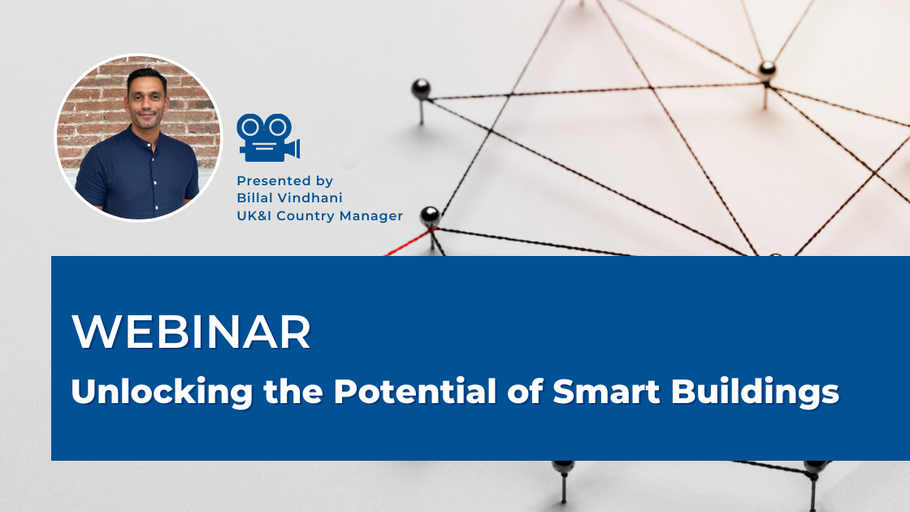We are pleased to announce that the recording of our webinar is available. This session focuses on data sharing to foster collaboration among stakeholders, deliver better outcomes, and make buildings work for people. This 20-minute webinar is hosted by our UK&I Country Manager, Billal Vindhani.
As buildings in the EU account for 40% of total energy consumption and 36% of greenhouse gas emissions, it is crucial to take action to make these buildings more efficient and sustainable in order to accelerate the sectoral transition. As a reminder, Europe aims to have a “zero-emission” building stock by 2050.
In this webinar, we explore the current challenges in facility management and highlight the importance of breaking down barriers between stakeholders and data silos to unlock the true benefits of smart buildings.
Challenges in Facility Management in 2023
Facility Management (FM) still faces major challenges, including:
- The complexity of building management: Facility managers must consider multiple factors such as maintenance, optimisation, and space utilisation.
- Generating results and maximising return on investments while improving user experience and involving multiple stakeholders within a facility.
- Meeting efficiency and sustainability objectives of the organisation, including ESG policies, regulations, and certification requirements.
- The ability to reinvent and go beyond being a mere service provider.
- Addressing the needs of multiple stakeholders within the same facility.
- Adapting to hybrid formats: dynamic, flexible, healthy, intelligent, and connected workplaces.
- Isolated data and information that hinder decision-making and/or investments.
To overcome these obstacles, it is essential to break down barriers between stakeholders and share data to facilitate collaboration and unlock the true benefits of smart buildings.
Smart Buildings: The Importance of Centralisation and Data Sharing
Centralising data using appropriate technologies is crucial in managing a smart building. It is not enough to simply know that a specific area has an air quality issue; it is equally important to relay this information to the appropriate person so that proactive measures can be taken. By addressing each domain in isolation, there is a risk of hindering collaboration among different stakeholders and departments.
Managing buildings that cater to individual needs requires close collaboration with multiple stakeholders. It is through fostering collaborative decision-making that significant results can be achieved. By integrating different data sources and eliminating silos, it becomes possible to obtain more comprehensive insights and strengthen cooperation among various departments and stakeholders throughout the building value chain.
Smart Buildings: The Importance of Making Wise Technological Supplier Choices
Managing a smart building involves selecting suppliers who possess key characteristics and capabilities. This includes seeking out agnostic platforms capable of aggregating data from multiple sources, including real-time data from sensors and Building Management Systems (BMS).
Data processing and analysis capabilities, utilising artificial intelligence and machine learning, are also crucial elements. Additionally, customisation and data sharing between applications (particularly through APIs), as well as the security and scalability of the solutions offered, must be considered when choosing suppliers.
Why watch the Recording of our Webinar on Smart Building Optimisation?
To understand how to leverage data to make smart buildings more efficient! This short session will enable you to:
- Break down data silos that hinder collaboration among stakeholders.
- Facilitate collaboration among owners, occupants, and all stakeholders to achieve multiple goals and accreditation standards.
- Transform the way spaces are operated, making them more efficient and sustainable.
- Shift from a reactive approach to a predictive, proactive, and results-oriented approach.
- Enhance occupant engagement by improving their experience and overall well-being.
In summary, proper utilisation of data in a smart building promotes collaboration and enables different stakeholders to work together more effectively. By removing barriers and centralising data, it is possible to optimise energy management, improve occupant comfort, implement predictive maintenance, and enhance security. This collaborative approach helps unlock the true benefits of a smart building for all stakeholders involved.
Are you interested in the topic of smart building management? We invite you to watch the recording now by clicking here!

![Unlocking the Potential of Smart Buildings [Webinar] | Spacewell Energy - Dexma](https://no-cache.hubspot.com/cta/default/437281/d2bba363-8bd4-4f9d-b6df-0ff262485e46.png)
![Unlocking the Potential of Smart Buildings [Webinar] | Spacewell Energy - Dexma](https://no-cache.hubspot.com/cta/default/437281/e51b765c-c0c9-46b9-8e0a-b734ea6c4252.png)

